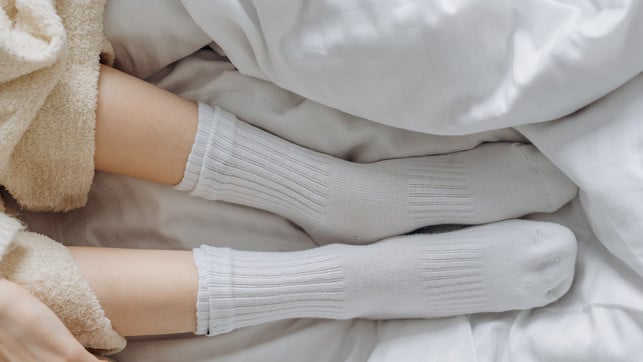
Opinions differ when it comes to the comfortable temperature for sleeping: Some people like to be cozy and warm in their bedroom, others love cold air – even in winter. The good news for all cold sleepers: Cool temperatures in the bedroom save energy – and therefore money – and are good for your health. There are good reasons for warm sleepers not to heat their bedroom or only heat it slightly.
![]()
This fall, too, the question of the optimal bedroom temperature is not just about the individual comfortable temperature, but also about saving as much energy and money as possible. Anyone who leaves the heating on at night uses a lot of energy and is also damaging to their health. We provide you with tips that will be good for your wallet and your health.
4 reasons for cold bedrooms
#1: Save energy
So that the electricity bill is not too high this winter, many people in Germany are thinking about where they can save energy. The savings potential is great in the bedroom:
- If you leave the blinds or shutters down during the day, you can reduce heat loss through the windows by up to 40 percent, depending on the window.
- Curtains can also help save energy.
- If you ventilate your bedroom properly, you save a lot of energy:
#2: Better sleep quality & metabolism benefits
In general, we sleep more deeply and more peacefully at lower temperatures than at higher ones. In addition: “When we sleep at higher temperatures, our body’s repair mode no longer works as well,” explains sleep coach Christine Lenz. “A cool temperature in the bedroom ensures that nighttime regeneration works better.” Cold stimulates metabolism, which shows the effectiveness of ice baths and cold therapies that are used for certain illnesses.
#3: Less headaches
On average, a person loses around 500 ml of fluid per night. If it is warm in the bedroom, the loss of fluids is even higher. This can lead to headaches. In general, a poor indoor climate, ie too little oxygen, too dry air and pollutants in the room air, can also cause headaches.
#4: Dry air weakens the immune system
Heating automatically leads to dry air and the mucous membranes in the nose dry out. If the mucous membranes are not sufficiently supplied with fluid, pathogens have an easier time of it and can multiply more easily.
Therefore: If you have trouble falling asleep or sleep restlessly, it could be because it is simply too warm in your bedroom. The right temperature in the bedroom can improve the quality of sleep.
Also exciting: self-experiment with cold showers: my conclusion after 5 months
Temperature in the bedroom: Cool does not mean cold
Even though we sleep better when it is cool, temperatures that are too low are not healthy either.
- If the rooms cool down too much, moisture collects on the walls, which can lead to the formation of mold.
- When it’s too cold, the body’s immune system is activated and goes into overdrive. This in turn disrupts sleep.
- And: If we cool down due to the low temperatures, the risk of us becoming ill increases.

Bedroom temperature: What is the optimal sleeping temperature?
There is no “optimum” temperature for sleeping. However, doctors agree: it should be between 16 and 19 degrees. Sleep expert Christine Lenz is of the opinion that the bedroom can be a little cooler than 16 degrees. “Cold temperatures when sleeping have health benefits: the body regenerates better, we sleep more peacefully.” It is important: “The body, especially the extremities, must not cool down. That’s why I recommend that my patients go to bed with socks, a scarf and a hat.”
The consumer advice center advises: “Even in rooms that are rarely used, the temperature should not fall below 14 to 16 °C, otherwise moisture will condense.”
Ultimately, the optimal sleeping temperature depends on individual preferences – and the thickness of your duvet. You shouldn’t feel cold or sweat at night. Older people often prefer a warmer room temperature in the bedroom than younger people. Regardless of whether you prefer to sleep a little colder or warmer: fresh air is important!
Tips to help you sleep well and healthily in the cold
- Falling asleep is extremely difficult when your feet are cold. A warm foot bath before going to bed helps.
- A hot water bottle that is placed in bed ten minutes before going to bed also ensures cozy warmth. You can find sustainable hot water bottles at Avocadostore, Yumeko or Amazon, for example.
- A duvet that fits you is important. Here you will find 6 recommended natural blankets:
Keep an eye on moisture in the bedroom
The relative humidity indoors – and therefore also in the bedroom – should be between 40 and 60 percent. The consumer advice explains: “From a relative humidity of around 70 to 80 percent directly on a wall, mold can grow. The wall does not have to feel damp and condensation does not have to be visible. This only happens when the relative humidity is 100 percent.”
The humidity in the room can be easily controlled with a thermo-hygrometer, which can be purchased at a hardware store for a few euros. In 2016, the Federal Association for Mold Remediation named the TFA Moxx model, which is available from around 11 euros, as the test winner and is available from Obi, Conrad or Amazon.
Tip: If you are unsure whether you already have a mold problem, a test kit can help. Such kits are available online, for example from the provider Ivario.
Tips for ventilation at night
Even though we at Techzle\.com generally recommend shock ventilation or cross-ventilation: at night, a tilted window can help reduce the humidity in the room. Especially if you have roller shutters that can be closed except for a few open slots.
Make sure there is no draft at night. Drafts can cause a cold or a tense or stiff neck.
Read more on Techzle\.com:
-
Does freezing make you sick or does it toughen you up?
- Ventilate properly: 12 tips to prevent mold in your home
-
Saving energy in the bedroom: Do you know the biggest energy guzzlers?
** marked with ** or orange underlined Links to sources of supply are partly partner links: If you buy here, you are actively supporting Techzle\.com, because we then receive a small part of the sales proceeds. More info.
You might also be interested in these articles
-
Really completely out? This is how you determine whether devices are really switched off
-
Switching off the TV instead of standby: Is it harmful to the TV?
-
Room too cold: You can do this
-
Electricity prices are exploding: 3 things you can do about it immediately
-
Renewable energies: Why only sun & wind save the climate
-
Dark doldrums make electricity expensive: Do we need more green electricity?
-
Green electricity at Öko-Test: 42 of 78 tariffs are “poor”
-
Extra bill for new electricity meters? Which households are affected
-
The first country with 100% green electricity: Costa Rica